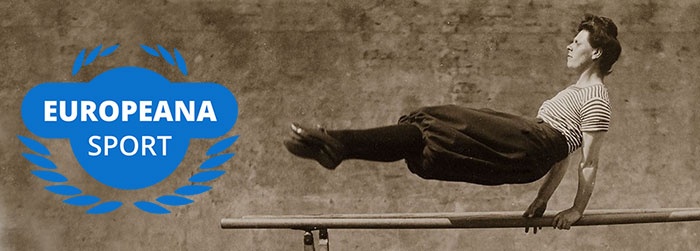Raising money for amateur athletes in the early 20th century
The Olympic Games in 1916 were due to be held in Berlin, but ultimately never took place because of the outbreak of World War I. This book is part of a failed British fundraising appeal for those games - and, somewhat counterintuitively, one of the most influential 20th century sport books published in Britain.
In the early 20th century, the ethos in British sport was one of sportsmanship, fair play, playing for the love of the game and the cult of the amateur.
This was exemplified by the London football team Corinthian F.C. who gave us the phrase the Corinthian Spirit and took the ideal of sportsmanship to what now seem like extremes. If Corinthian F.C. broke the gentleman’s code of sportsmanship by fouling the opposition and giving them a penalty, their goalkeeper would stand to one side and give the opposition a free shot at goal. If they were awarded a penalty, the Corinthian captain would deliberately kick the ball over the crossbar not wanting to take advantage of an error by the other team. How you played was as important, perhaps more important, than winning.
The 20th century would see a gradual erosion of amateurism in both British sport and the Olympics. In 1913, calling someone an amateur would be a great compliment - today it would be more likely to be taken as an insult. This publication from 1913 is an important step in that change in attitudes.
'The Olympic Games and the Duke of Westminster’s Appeal for £100,00' was a reaction to what was seen as Great Britain’s underperformance at the 1912 Summer Olympics held in Stockholm. Great Britain had ranked third in the medal table behind the United States and the hosts, winning only 10 gold medals in comparison to the United States 26 and Sweden’s 24. Immediately after the 1912 Olympics, both Sweden and America started public fundraising campaigns for the planned 1916 Berlin Olympics, hoping that they might do even better.
In August 1912, Sir Arthur Conan Doyle (the creator of Sherlock Holmes) wrote a letter to The Times saying something must be done to arrest Britain’s sporting decline. 'The debate as to our preparations for the next Olympics Games tends to take the shape of recrimination rather than of construction. Might I appeal to all concerned to let bygones be bygones, and to centre our efforts upon the future? The scoring of debating points over each other only darkens counsel. The chief offender in the past has been the easy going public, which has not taken an interest until our comparative failure at Stockholm came to awaken it out of its indifference.'
Doyle’s appeal for a united front and a change in approach led to an appeal being launched in 1913.
It was led by Hugh Grosvenor, the Duke of Westminster and the wealthiest man in Britain at that time. Doyle was appointed as a member of the appeal’s committee. This book was published andsold at threepence a copy to benefit the appeal. The appeal aimed to raise £100,000 (the equivalent of £10 million today) to help with preparations for the Berlin Olympics.
The book analyses the reasons for Britain’s lack of success at recent Olympic Games. It suggests reforming the bodies that administer British sport, proposes that coaching schemes should be established, and that funding should be available for elite athletes. It combines this with a legacy element that would encourage participation in sport and fund sport facilities for the general public.
Over a century later this is still broadly Britain’s approach to sports funding.
While money flowed into the Swedish and American Olympic appeals, the Duke of 5Westminster’s appeal was a failure. The appeal was attacked in the press for being a threat to the amateur ethos which was not just central to British sport but to how the British viewed themselves. It was also seen as being overly focused on a few elite athletes rather than more broadly benefiting sport. Sporting success was seen by many as being the result of a combination of natural ability and good character. Coaching and preparation were viewed almost as bordering on cheating - it was more sporting to just turn up and take part.
The British sporting establishment of 1913 was listening though and signed up to the need for reforms in how sport was administered. It was hoped Britain would be in much better sporting shape for 1916 in Berlin and certainly for the 1920 Olympics.
British sport had a similar crisis of confidence in the aftermath of the 1996 Atlanta Olympics when the country won just one gold medal and finished in 36th place in the medal table. This led to changes in how sport was developed in Britain and, crucially, introduced National Lottery funding for elite sports in 1997. This paved the way for the success of Team GB at the London Olympics in 2012, Rio in 2016 and the delayed Tokyo Olympics in 2021.
The seeds of this success though arguably lie in this curious little book and the failed appeal for the Olympics that never took place in Berlin in 1916, and how it changed the way Britain plans for and views major sporting events.
Share your sport story
Can you help us to tell the story of sport in Europe in the past and the present?
We invite you to tell us about your sport experiences through objects like photographs, memorabilia, equipment or prizes.
Share your story →
This blog is part of the Europeana Sport project which showcases cultural treasures relating to sporting heritage in Europe.

